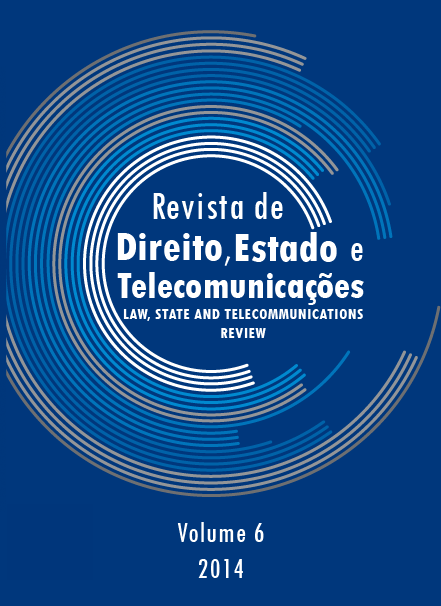Administrative Process Theory applied to Spectrum Regulation
DOI:
https://doi.org/10.26512/lstr.v6i1.21556Palabras clave:
Regulation. Radio spectrum. Administrative process theory. Public interest. Brazil.Resumen
Purpose ”“ This paper is intended to assess the efficacy of an administrative process theory as the foundation to regulate the radio spectrum in a scenario that contemplates private allocation of spectrum and the protection of public interest. Methodology/approach/design ”“ The text abides to the problem-action methodology, in which the paper is structured to respond to real problems arising from the flexibilization of the command-and-control model to regulate radio spectrum.
Findings ”“ The administrative process theory is viable and necessary since it protects the public interest while it allows for the flexibility of the norms guiding the allocation and use of radio spectrum without delivering regulatory rents.
Practical implications ”“ The paper works as a guideline to establish safe rules for altering rules and allocations of radio spectrum in Brazil. It also fills the void of a consistent study on the theme of spectrum reform, since it secures the public interest while allowing for spectrum property to be transferred to private parties.
Referencias
BAUMOL, Williamet al.Towards an Evolutionary Regime for Spectrum Governance: Licensing or Unrestricted Entry. Washington, D.C.: AEI Brookings, 2006.
BENKLER, Yochai. Some Economics of Wireless Communications.In: Journal of Law and Technology25(16), 2002.
BLACK, Duncan. The Theory of Committees and Elections. Massachussets: Kluwer Academic Press, 1987.
COASE, Ronald. The Federal Communications Commission. In: Journal of Law and Economics21(40), 1959.CROLEY, Herbert. The Promise of America Life. Create Space Independent Publishing, 2011.
CROLEY, Steve. Regulations and Public Interests. The Possibilty of good Regulatory Government. Princeton: Princeton Press, 2008.
DE VANY, Arthuret al.A Property System Approach to the Eletromagnetic Spectrum: A Legal-Economic-Engineering Study. In: Stanford Law Review, vol. 21, 1969.
DOWNS, Anthony. An Economic Theory of Democracy.Boston: Addison Wesley Publishing Co, 1957.
GAUDEMET, Yves et al.Le Système Français D’Exploitation du Domaine Public Hertizien et D”Attribuition des Fréquences Radioelétriques. Rappot Du Groupe de Travail. Disponível em: http://www.fondation-droitcontinental.org/upload/docs/application/pdf/2011-10/rapport_mai_2010.pdf.
FULLER, Steve. The Governance of Science. Philadelphia: Open University Press, 2000.
HEILBRONER,Robert. Do Machines Make History?In: SMITH, Merrit et al.Does Technology Drive History?Cambridge: MIT Press,1994.
LEVIN, Harvey. The Invisible Resource: Use and Regulation of the Radio Spectrum. Washington, D.C.: RFF Press, 1971.
MANOÃLESCO, Mihaïl. Le Siècle du Coporatisme: Doctrine du Corporatisme Intégral et Pur. Paris: Libraire Félix Alcan, 1934.
MASUDA, Yoneji. The Information Society as Post Industrial Society. Washington, D.C.: World Future Society, 1980.
PEZ, Thomas.Le Domaine Public Hertzien: Attribuition et Exploitation des Fréquences Radioéletriques. Paris: Lextenso éditions, 2011.
SARDINHA, Luciana Raso. Radiodifusão: Controle Estatale Social sobre Outorgas. Belo Horizonte: Mandamentos, 2004.SPULBER, Daniel et al.Networks in Telecommunications: Economics and Law.New York: Cambridge University Press,2009.TRUMAN, David. The Governmental Process, in Buchanan, James et al. The Calculus of Consent: Logical Foundations of Constitutional Democracy.Ann Arbor: University of Michigan Press, 1965.WALDO, Dwight. The Administrative State: A Study of the Political Theory of American Public Administration.New Brunswick: Transaction Publishers, 2007.
YEUNG, Karen The Regulatory State. In: BALDWIN, Robert. The Oxford Book of Regulation.Oxford: Oxford University Press, 2010.
Descargas
Publicado
Número
Sección
Licencia
Al enviar este documento a la Revista de Derecho, Estado y Telecomunicaciones,
declaro que estoy aceptando los términos de Creative Commons Attribution 4.0 International (CC BY 4.0)


